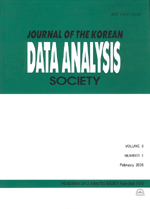An Empirical Study of Markowitz’s Optimal Portfolio Using Principal Component Analysis: Standard Deviation, VaR and ES as Risk Measures
- 한국자료분석학회
- Journal of The Korean Data Analysis Society (JKDAS)
- Vol.12 No.3
-
2010.061249 - 1260 (12 pages)
- 3

This study presents a new application of Singular Value Decomposition(SVD), which is related to Principal Component Analysis(PCA), to Markowitz’s mean-variance optimal portfolio and further test its empirical applicability. In the past period(2000~2004), efficient frontiers(Markowitz, 1952) were derived with two different covariance matrixes from stock returns in KOSPI200, namely original covariance matrix and SVD-applied covariance matrix. These covariance matrixes were also used to draw efficient frontier in the future period (2005~2007). Expected returns are arithmetic averages in a corresponding period. The results showed that an actual efficient frontier in the future period is closer to the frontier from SVD-applied covariance matrix than the frontier from original covariance matrix. Employing other risk measures such as Value-at-Risk and Expected Shortfall than standard deviation presented the same results and confirmed the usefulness of SVD to optimal portfolio.
1. Introduction
2. Methodology
3. Data and Empirical Design
4. Empirical Results
5. Conclusion
References
(0)
(0)